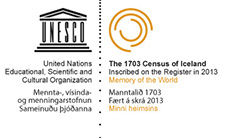
According to the Public Archives Act 2014 No 77, 28 May, The National Archives of Iceland operates as a separate government entity under the authority of the Minister of Education, Science and Culture.
The role of the National Archives of Iceland is to implement public policy on archiving and records management. In addition, it serves a role as a public archive.
Institutions and government departments are expected to preserve the materials produced in the course of their work and those that they receive. When these materials are 30 years old, they are to be made over to the National Archives. Regional archives receive materials from the local authorities, the Reykjavik Archives being the depository for materials from the city's institutions. In cases where there are no regional archives, the National Archives is the depository for materials from local authorities.
Disposal of materials is prohibited unless it conforms to the National Archives' rules and special permission is granted by the archives' governing board for such disposal. Thus, the National Archives ensure that all materials regarding the rights and duties of the state and individuals are preserved.
The National Archives are also responsible for setting rules on document management by state bodies, maintaining registers of its archive collections and ensuring legally prescribed access to materials by institutions and the general public.
All state archive materials, and those of many local authorities and a large number of private archive collections are preserved in the National Archives; of the individual archives, some contain only a few documents while in others the numbers run to hundreds of thousands. The principal collections are those of various government officials and departments and their predecessors from the time of the Reformation to the present day, including the national and regional governors and the administrative departments from the time when Iceland was under Danish rule, the first Home Rule administration, the government ministries, the district commissioners, bishops and clergy. Materials in the archives include church registers, census materials, court reports, mortgage registers, official letters, legal documents, tax returns and other materials relating to individuals.





